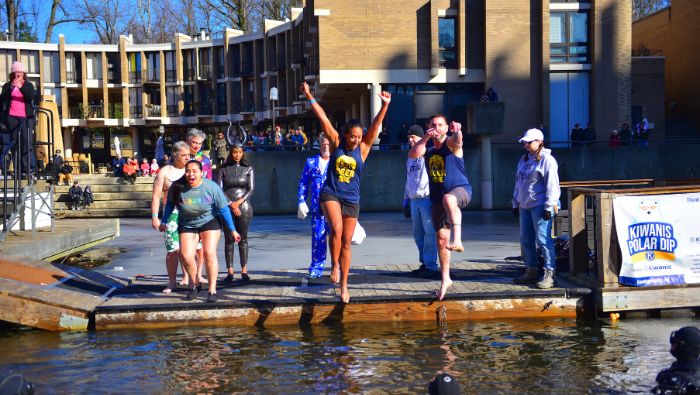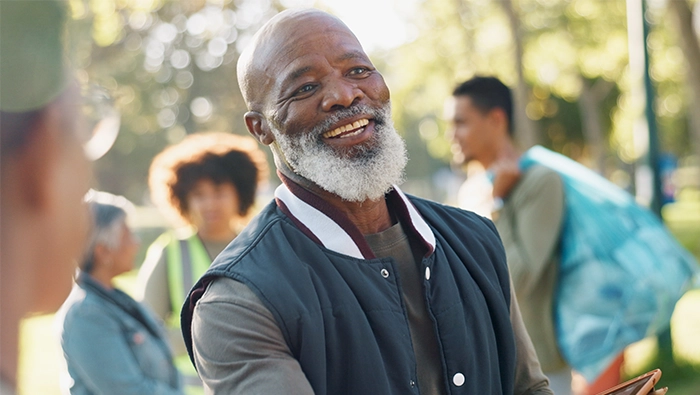
Best of 2025
It’s almost time to ring in 2026, but before we toast to a new year, let’s look back at some of the amazing Kiwanis family projects, events and achievements in 2025.
By Sarah Moreland Byrne
Help when it’s needed most
Service is the heart of Kiwanis, and 2025 was no exception. Here are just some of the ways members around the world helped kids and families in need:
Support for education:
- In Uganda, the Kiwanis Club of Nakivale distributed school supplies to more than 200 students.
- In Jamaica, a new scholarship will cover tuition for an associate degree for 10 students each year.
- In Vanuatu, students at Vanua Leadership College will learn practical skills thanks to 10 new sewing machines donated by the Kiwanis Club of Christchurch in New Zealand.
Children’s health and well-being:
- The Indiana District of Kiwanis committed to raising US$1 million to fund mental health services at a children’s hospital.
- In Italy, the Kiwanis Club of Chieti Pescara G. D’Annunzio provided free health screenings for kids and helped purchase a neonatal ambulance.
- The Kiwanis Club of Badenweiler-Müllheim in Germany is keeping students safe by donating 275 high-visibility safety vests.
Relief in tough times:
- After heavy flooding in Romania, the Kiwanis Club of Saverne-Cité des Roses in the France-Monaco District delivered 44 pallets of clothing and sporting goods.
- The Kiwanis Club of Barrie in Ontario, Canada, helped six Ukrainian refugee families relocate and adjust to life in a new country.
- Twenty-seven teachers in California who lost their homes in the second most destructive wildfire in state history received financial assistance from the Kiwanis Club of La Cañada.
Looking for more examples of amazing Kiwanis projects? Meet the winners of the 2025 Kiwanis Signature Project Contest.
Submissions for the 2026 Signature Project Contest will be accepted beginning January 6.
Global impact
More than US$9 million has been raised in cash and pledges so far for The Kiwanis Possibility Project, the first fundraising campaign that solely supports Kiwanis and the children we serve. Our goal: US$25 million to help 10 million children around the world be healthy, happy and successful.
Other highlights from the Kiwanis Children’s Fund:
- Meet the eight outstanding Key Club and CKI leaders who received scholarships to continue their education. Students can apply now until February 1, 2026, for the next round of scholarships.
- The third annual Kiwanis Day of Giving nearly doubled its initial goal, resulting in US$186,000 raised for the Children’s Fund! That’s enough to reach more than 82,000 children. Mark your calendars now: Kiwanis Day of Giving returns February 25.
Learning and leadership
Kiwanis Amplify: Our online leadership program surpassed 2,000 all-time participants this year! Congratulations to these Kiwanians, who are using what they’ve learned to take on more leadership roles — not just within the organization but also in their professional and personal lives.
The journey isn’t over yet! Kiwanis Amplify returns in 2026 with 22 new subject matter experts — and the first 200 incoming Kiwanis lieutenant governors to register will participate for free. Sign up to be the first to know when registration is live.
New leaders: At the 2025 Kiwanis International Convention in Pittsburgh, Pennsylvania, U.S., delegates elected Michael Mulhaul of the New Jersey District as 2025-26 Kiwanis International president. Hope Markes of the Eastern Canada and Caribbean District was elected to serve as president-elect, and Cathy Szymanski of the Pennsylvania District as vice president. Timothy Sheppard of the Rocky Mountain District and Amy Zimmerman of the Ohio District were elected trustees for the United States and Pacific Canada Region.
Also joining the board for three-year terms are Shinichi Yoshikuni of the Japan District and Jon-Fadri Huder of the Switzerland-Liechtenstein District. See the full House of Delegates recap.
Start planning for the 2026 Kiwanis International Convention in Manila, Philippines, June 24-27!
Plus new ways to …
Volunteer with the Kiwanis family: We introduced Kiwanis Voices, a pilot program that allows 18- to 26-year-olds to join Kiwanis with their peers — and helps them move together through the early years of their service journey.
Experience Kiwanis stories: In March, we launched our new podcast! With topics ranging from teddy bears and Thanksgiving meals to farm fun and honoring veterans, “Here’s an Idea” shares fundraising tips, service project ideas and more through conversations with members, leaders and staff. Listen to this year’s 13 episodes — and growing — wherever you get your podcasts, or watch the video recordings.
Start a project if you’re part of a new club: The Kiwanis Children’s Fund kicked off its new Kickstarter grant program, which invites new clubs that charter with at least 30 active members to apply for a service grant.
Celebrating youth leadership
The Kiwanis family consists of volunteers of all ages. Our Service Leadership Programs (SLPs) span elementary school through university and include a club for adults with disabilities. Here are a few SLP highlights for 2025:
Key Club turned 100! Key Club International, our program for high school students, celebrated 100 years of leadership and service with alumni events, a district-based challenge, appearances from past presidents — even a commemorative book! At the annual Key Club convention, Isabella Baldisseri of the Pacific Northwest District was elected as 2025-26 Key Club International president.
CKI is growing! Circle K International, our program for university students, chartered 33 new clubs this year — the most since 2017. CKI joined Kiwanis in Pittsburgh to host its 2025 convention in tandem with the Kiwanis International convention. Delegates elected Jonathan Huang of the New England District to serve as 2025-26 Circle K International president.
Supporting worldwide causes: Key Club and Circle K International continued to partner with UNICEF USA on fundraising campaigns, Start Strong: Zambia and Brick x Brick, respectively. Three Key Club board members even traveled to Zambia to see their impact in action.
P.S. Save the dates for K-Kids Week and Builders Club Week in February and Aktion Club Week in March!
Interested in starting an SLP club? Check out these seven reasons students in your community could benefit from an SLP club.


